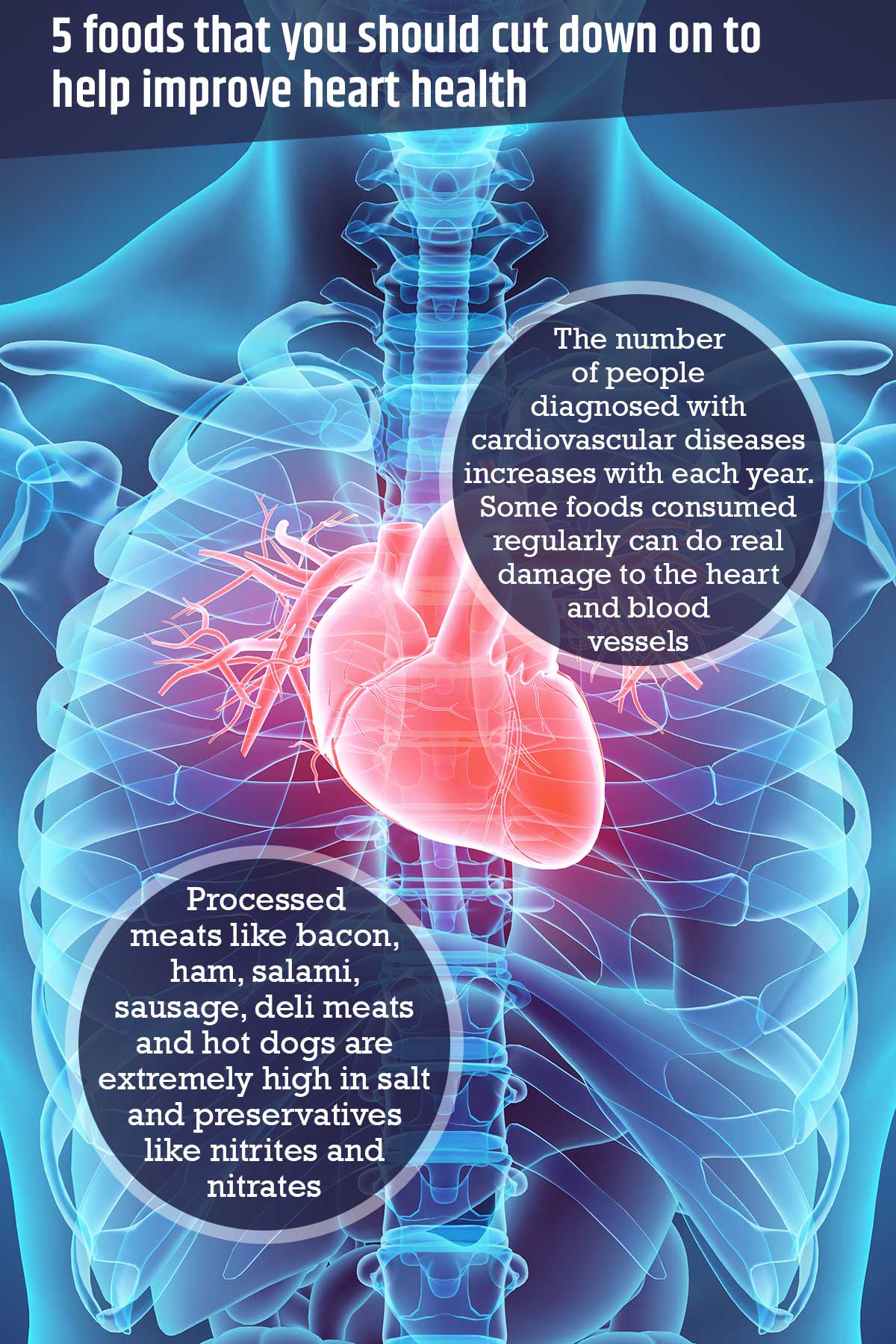The number of people diagnosed with cardiovascular diseases increases with each year. There are numerous reasons for that, with unhealthy diet being one of the main factors. Some foods consumed regularly can do real damage to the heart and blood vessels.
1. Sugar-Sweetened Beverages
Beverages and not foods are the biggest sources of sugar for many Americans.1✅ JOURNAL REFERENCE
DOI: 10.1001/jamainternmed.2013.13563 Government reports state that over 45% of women, 54% of men and 60% of children consumed at least one sugar-sweetened drink or soda per day in 2011-2014. The thing is that all these beverages (energy drinks and sodas) are packed with added sugar and empty calories.
Thus, a 12-oz soda can contains about 10 teaspoons of added sugar per serving, whereas it’s recommended to take not more than 9 teaspoons for men per day and 6 for women to prevent obesity, which is a heart disease risk factor.
Recent studies suggest that there is a link between sweetened beverages and increased risks of dementia and stroke2✅ JOURNAL REFERENCE
DOI: 10.1161/STROKEAHA.116.016027 and even diet soda is believed to be associated with an increased risk of cardiovascular events.3✅ JOURNAL REFERENCE
DOI: 10.1007/s11606-011-1968-2
What to do: If you like fizzy drinks, try to mix seltzer with some orange or fresh lime. You can also drink unsweetened black or green iced tea to get antioxidants and satisfy your thirst.
2. Processed Meat
Many of us think that a good old-fashioned ham sandwich is a pretty healthy choice, but it turns out that it’s not that healthy after all.
Processed meats like bacon, ham, salami, sausage, deli meats (even lean ones) and hot dogs are extremely high in salt and preservatives like nitrites and nitrates – about 50% more nitrates and 400% more sodium per gram than in unprocessed meat – which makes them a major no-no for the heart.
Recent studies show that 50 g daily serving of processed meat is associated with 19% higher diabetes risk and 42% higher coronary heart disease risk, whereas unprocessed meat consumption is not associated with such risks.4✅ JOURNAL REFERENCE
DOI: 10.1007/s11883-012-0282-8
What to do: For your sandwiches use sliced up leftovers of the meat you have prepared yourself (for example, grilled chicken) instead of cold cuts.
3. White Bread and Pizza
Foods like pizza, white rice and white bread are rich in carbohydrates which are rapidly absorbed and have a high glycemic index (GI), resulting in a spike in blood sugar levels.
An Italian study has shown that those who consume a lot of high-GI foods have an overall increased risk of coronary heart disease. However, researchers say that this affects only women and not men, perhaps that is due to sex-related differences in glucose and lipoprotein metabolism.5✅ JOURNAL REFERENCE
DOI: 10.1001/archinternmed.2010.15
What to do: Unrefined whole-grain alternatives with low glycemic index like whole-wheat bread and wild or brown rice are good and healthier substitutes for high-GI carbs.
4. Canned Soup
While a tasty soup can be a good way to get some calories and curb your hunger, not all soups are as healthy as you might think; actually, certain canned soups can be harmful to your heart.
Canned soups have the highest sodium density among all packaged foods,6✅ JOURNAL REFERENCE
DOI: 10.3945/ajcn.113.078980 which means they are extremely unhealthy and should be especially avoided by people with high blood pressure, diabetes or chronic kidney disease.
Campbell’s regular tomato soup contains around 400 mg of sodium/serving, whereas it’s recommended by the American Heart Association to consume less than 140 mg of sodium/serving.7✅ JOURNAL REFERENCE
DOI: 10.1016/j.amjmed.2016.10.019 Lower sodium consumption can reduce coronary heart disease risk and also risk of stroke.8✅ JOURNAL REFERENCE
DOI: 10.1136/bmj.f1326
Another issue with canned soups is that its plastic lining contains a toxin called BPA (Bisphenol A), which can leach into food. It’s believed that exposure to BPA is linked to an increased risk of various cardiovascular diseases.9✅ JOURNAL REFERENCE
DOI: 10.1016/j.envres.2016.06.00810✅ JOURNAL REFERENCE
DOI: 10.3390/ijerph110808399
What to do: The best soup is a homemade soup because you can control the amount of salt you add. However, if you are short of time and a do-it-yourself cooking project is not an option, then look for low-sodium soups in Tetra Pak.
5. Packaged Juices
Many of the “all-natural” packaged juices are filled with additives and artificial food coloring. Moreover, packaged fruit juices are loaded with enormous amounts of sugar, whereas vegetable juices often have too much sodium added.
Increased consumption of sugar contributes to obesity and higher risk of cardiovascular disease mortality, as for high sodium intake, it’s associated with increased risk of hypertension and stoke.
What to do: Try some refreshing detox water – add some fresh berries to your water and enjoy. Always give your preference to whole fruits and vegetables, they can provide you with all the fiber, minerals, vitamins and antioxidants found in them.



